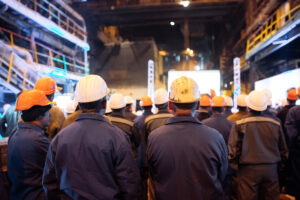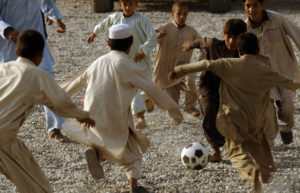Photo of the Week: The Latest Devastation of Haiti
Why is Haiti so vulnerable to disaster? In addition to geography, there's a legacy of debt, poverty, political instability, foreign exploitation and negligence, corruption and violence.
A church lies almost entirely destroyed by Hurricane Matthew in Les Cayes, Haiti. (Dieu Nalio Cherry / AP)
Every week, Truthdig’s editors seek to present an image that singularly renders the world’s triumph, trouble or toil.
Wikipedia has an entry titled “List of natural disasters in Haiti.” It contains a “non-exhaustive” list of “cyclones, hurricanes, tropical storms, torrential rains, floods and earthquakes” that struck Haiti dating back to 1954 and is sure to grow as climate change exacerbates the weather. In May 2004, torrential rains in the country’s southeast killed 1,232 people, “disappeared” 1,443 and displaced 31,130. Later that year, Hurricane Jeanne killed 3,000 people, injured nearly as many and displaced 300,000 Haitians.
In January 2010, magnitude 7 and 6.1 earthquakes struck within 10 days of each other, killing between 46,000 and 316,000 Haitians (the wild extremes of that range suggest their own story—that of the Haitian government’s incapacity to keep track of basic measures of the public’s well-being. In many instances, the government failed to calculate the extent of property damage.) Later in 2010, a cholera epidemic, unwittingly provoked by United Nations workers, killed 3,500 people and sickened more than 340,000. Laurent Lamothe, Haiti’s prime minister from 2012 to 2014, said the quake “literally set us back 50 years.”
Now, the death toll from Hurricane Matthew—which attacked with 145 mph winds, creating flying debris and swollen rivers—has soared to almost 900, while tens of thousands are said to be homeless. Plantations are ruined. Livestock has drowned. The Pan American Health Organization warns of another cholera epidemic as floodwater mixes with sewage.
Why is Haiti so vulnerable to disaster? While the answer begins with geography, it moves rapidly to a consideration of the country’s history of poverty, debt, political instability, foreign exploitation and negligence, corruption and violence.
“What has really left Haiti in such a state today, what makes the country a constant and heart-rending site of recurring catastrophe, is its history,” wrote Guardian correspondent Jon Henley in 2010 in an article titled “Haiti: a long descent to hell.” “In Haiti, the last five centuries have combined to produce a people so poor, an infrastructure so nonexistent and a state so hopelessly ineffectual that whatever natural disaster chooses to strike next, its impact on the population will be magnified many, many times over. Every single factor that international experts look for when trying to measure a nation’s vulnerability to natural disasters is, in Haiti, at the very top of the scale. Countries, when it comes to dealing with disaster, do not get worse.”
“Haiti has had slavery, revolution, debt, deforestation, corruption, exploitation and violence,” says Alex von Tunzelmann, a historian and writer quoted in Henley’s article. “Now it has poverty, illiteracy, overcrowding, no infrastructure, environmental disaster and large areas without the rule of law. And that was before the earthquake. It sounds a terrible cliche, but it really is a perfect storm. This is a catastrophe beyond our worst imagination.”
“It needn’t, though, have been like this,” Henley continues. “In the 18th century, under French rule, Haiti—then called Saint-Domingue—was the Pearl of the Antilles, one of the richest islands in France’s empire (though 800,000-odd African slaves who produced that wealth saw precious little of it). In the 1780s, Haiti exported 60% of all the coffee and 40% of all the sugar consumed in Europe: more than all of Britain’s West Indian colonies combined. It subsequently became the first independent nation in Latin America, and remains the world’s oldest black republic and the second-oldest republic in the western hemisphere after the United States. So what went wrong?
“Haiti, or rather the large island in the western Atlantic of which the present-day Republic of Haiti occupies the western part, was discovered by Christopher Columbus in December 1492. The native Taino people knew it as Ayiti, but Columbus claimed it for the Spanish crown and named it La Isla Española. As Spanish interest in the island faltered with the discovery of gold and silver elsewhere in Latin America, the early occupiers moved east, leaving the western part of Hispaniola free for English, Dutch and particularly French buccaneers. The French West India Company gradually assumed control of the colony, and by 1665 France had formally claimed it as Saint-Domingue. A treaty with Spain 30 years later saw Madrid cede the western third of the island to Paris.”
And from there, a history of colonialism continued in which Haitians were treated as incidental to their country’s natural wealth and convenient location. A revolution regarded as the greatest slave uprising since Spartacus unsuccessfully challenged the rulers of Rome nearly two millennia before ended traditional colonialism at the turn of the 19th century. But freedom from the country’s former masters did not come with a foundation for general welfare and prosperity. “In exchange for diplomatic recognition from France,” Henley writes, “the new republic was forced to pay enormous reparations: some 150m francs, in gold. It was an immense sum, and even reduced by more than half in 1830, far more than Haiti could afford.”
“The long and the short of it is that Haiti was paying reparations to France from 1825 until 1947,” adds Von Tunzelmann. “To come up with the money, it took out huge loans from American, German and French banks, at exorbitant rates of interest. By 1900, Haiti was spending about 80% of its national budget on loan repayments. It completely wrecked their economy. By the time the original reparations and interest were paid off, the place was basically destitute and trapped in a spiral of debt. Plus, a succession of leaders had more or less given up on trying to resolve Haiti’s problems, and started looting it instead.”
The pattern persists to the present. The legacy in Haiti of the nonprofit Clinton Foundation, founded by former President Bill Clinton and current Democratic presidential candidate Hillary Clinton, forms a representative example. Many Haitians recall the Clintons’ efforts there by the illness they contracted from the formaldehyde-laced instructional trailers shoddily constructed by the same company that was sued for sickening victims of Hurricane Katrina. Others recall reconstruction money promised by the Clinton-Bush Haiti Fund that never came, as well as a frustrated standard of living that was supposed to be raised by jobs provided by a new foreign-funded and -owned garment factory. The book “The Big Red Truck That Went By,” by journalist Jonathan Katz, tells the story.
In 2010, Bill Clinton apologized before the Senate Committee on Foreign Relations for making a “devil’s bargain on rice” that damaged Haitians’ ability to provide their own food by arranging for the country to purchase rice from foreign producers, including “some of my farmers in Arkansas.” “It was a mistake,” Clinton said, explaining that the architects of international trade policy taught that poorer countries could move straight into industrial production if they were relieved of the need to produce their own food. “You just can’t take the food chain out of [local] production,” he said. It “undermines a lot of the culture, the fabric of life, the sense of self-determination.”
Looking to Haiti’s future after Hurricane Matthew, Matthew Smith, professor of Caribbean history at the University of the West Indies-Mona, worried Thursday that “Haiti’s fragile democracy must not be knocked off course” now that the hurricane has indefinitely postponed a presidential election scheduled for today. Beyond Haiti’s borders, “There is now a desperate need for a new type of engagement with Haiti. After Matthew, Haiti simply cannot endure any more broken promises.”
Independent journalism is under threat and overshadowed by heavily funded mainstream media.
You can help level the playing field. Become a member.
Your tax-deductible contribution keeps us digging beneath the headlines to give you thought-provoking, investigative reporting and analysis that unearths what's really happening- without compromise.
Give today to support our courageous, independent journalists.





You need to be a supporter to comment.
There are currently no responses to this article.
Be the first to respond.